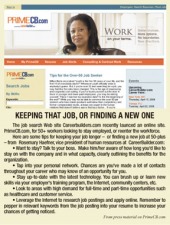By Debbie Gardner PRIME Editor Editor's Note: This is the second installment in PRIME's two-part series on planning for retirement. If you missed Part One, you can find it here on the features section of our Web site. So, you've started thinking about how you want to spend your time post- 9-to-5, you've [hopefully] discussed this grand plan with your spouse or significant other, and you're ramping up your financial planning to ensure you can afford all that leisure time. You're all set for the golden handshake, right? Not quite. There are still a few areas you'll need to think about before you punch that last time card, or send that last bill to a patient or client. Here are a few more points to ponder: Navigating the health insurance maze Should you take out a COBRA plan to replace your health insurance if you're looking at early retirement? Would it be better to stay at your current job or take another position and work longer to qualify for Medicare? What about policies for prescription drug coverage or long-term care? Do you need new or more life insurance coverage? The breadth of insurance needs at retirement can trigger myriad questions, not all of which are easily answered. But all of these issues need to be taken into account as you work out a retirement plan. Because, after all, they all cost money. Money you won't necessarily be making at the same rate once you leave the work world. Little planning for a big expense According to a national survey conducted by Medco Health Solutions, a mail-order prescription service, more than half of current retirees failed to factor in the potential long-term costs of heath care and prescription drugs when planning for retirement needs, with one out of every three survey respondents saying they are spending far more on health care costs than they anticipated. That same study also cites some hard numbers: one in four of those same middle-income retirees are now spending one out of every $10 of their monthly income on prescription drugs alone. "Retirees have planned for food, shelter, taxes and entertainment, but too many neglect drug and medical costs which are rising far faster than theinflation rate [and] are jeopardizing the quality of life they expect to enjoy during retirement," said Sally Greenberg, executive director, National Consumers League as quoted in a Medco news release about the survey. This, according to Medco, is especially true for women and people in living in the Northeast. Over 50 percent of women report they are spending more on health care than they anticipated and of surveyed retirees living in the Northeast, 45 percent report higher health spending then they had planned for. Doing the health care homework In his book, "The 250 Retirement Questions Everyone Should Ask," author David Rye gives the following tips for planning your health-care needs at retirement: 1. Make sure you have a thorough understanding of how Medicare works when you are eligible (and need to sign up), what your premium will cost on a monthly basis, what Medicare will and will not cover, what portion of the cost of any medical treatment will be your responsibility, etc. 2. Keep abreast of what's going on in the Health Maintenance Organization (HMO) industry one of the most affordable types of health care you can enroll in (even when you have Medicare). 3. Make an appointment with a knowledgeable insurance agent (if you are already retired, check with a SHINE -Serving the Health Insurance Needs of the Elderly representative at your local Senior Center) to evaluate plans and determine what coverage best fits your needs. 4. Check out plans that may be offered by organizations you belong to, such as religious, fraternal and professional groups. 5. Pay attention to enrollment dates and any rules of care for your insurance, such as pre-approval for tests or hospital admissions. 6. Take steps to reduce your prescription drug costs by investigating generic alternatives to name-brand drugs, asking about substituing a lower-cost drug for an expensive prescription, shopping pharmacies for price and looking for a discount program. A word about COBRA According to Rye's book, if you worked for a company that employed more than 20 people, and you choose to retire early, federal law allows for you to continue with that health plan for 18 to 36 months. The big drawback of taking out COBRA insurance is that you are responsible for the entire premium yourself, with no subsidy from your employer. There are stipulations regarding disability within the first 60 days of coverage, death and the obligation for spouses and dependents, and other factors. For complete information about how COBRA insurance coverage works, Rye suggests readers visit www.cobrainsurance.net. Do you need long-term care insurance? In "The 250 Retirement Questions Everyone Should Ask," Rye cites figures provided by the National Association of Insurance commissioners that indicated one in four retirees will spend some time in a nursing home (those numbers are higher for women). As Medicare only covers the first three months of any stay, the odds are you'll need some sort of supplement (unless, Rye said, your assets are in excess of $1 million and you're not planning to pass those assets on to a spouse or children at your death). If you are contemplating buying long-term care insurance, Rye urges that you pony up sooner rather than later, both in terms of health status (you can't buy a policy unless you are in reasonably good health) and in premium costs, which are lower the younger you are when you buy in. |
 | ||
 | ||
 | ||